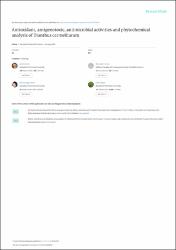Antioxidant, antigenotoxic, antimicrobial activities and phytochemical analysis of dianthus carmelitarum

Göster/
Erişim
info:eu-repo/semantics/openAccessTarih
2017Yazar
Aliyazıcıoğlu, RezzanDemir, Selim
Badem, Merve
Şener, Sıla Özlem
Korkmaz, Nuriye
Demir, Elif Ayazoğlu
Özgen, Ufuk
Karaoğlu, Şengül Alpay
Aliyazıcıoğlu, Yüksel
Üst veri
Tüm öğe kaydını gösterKünye
Aliyazıcıoğlu, R., Demir, S., Badem, M., Şener, S.Ö., Korkmaz, N., Demir, E.A. & Aliyazıcıoğlu, Y. (2017). Antioxidant, Antigenotoxic, Antimicrobial Activities and Phytochemical Analysis of Dianthus carmelitarum. Records of Natural Products, 11(3), 270-284. https://app.trdizin.gov.tr/makale/TWpZNU5qWTRPQT09Özet
In this study, we investigated the phytochemical composition, antioxidant, antimicrobial, and antigenotoxic properties of the aqueous extract of Dianthus carmelitarum for the first time. The phenolic and volatile compounds, antioxidant, antimicrobial and antigenotoxic activities of the extract were determined by HPLC and SPME-GC-FID/MS, spectrophotometric, agar well diffusion methods and comet assay, respectively. The polyphenolic content and ferric reducing power values of the extract were found 12.6 ± 0.27 mg gallic acid and 238 ± 2.89 ?M trolox equivalents per g sample, respectively. Syringaldehyde and chlorogenic acid were detected as major phenolic compounds, while terpenes were determined as major volatile compound. Dianthus carmelitarum extract especially exhibited moderate antimicrobial activity against Mycobacterium smegmatis. Extract reduced H2O2-induced DNA damage in a concentration dependent manner in fibroblast cells compared to positive control (only 20 ?M H2O2 treatment). Dianthus carmelitarum can be considered in the food, cosmetic, and drug industries due to its antioxidant, antimicrobial, and antigenotoxic activities

















